
Moritz Kuhn
@mokuhn.bsky.social
Professor of Economics, U Mannheim, private account=private opinion
We show that we should expect such a strong reaction of separation rates after UI reforms in countries with low job-finding rates as in 🇩🇪 & most 🇪🇺 countries, while the main adjustment will come from job-finding rates in countries like the 🇺🇸 with high job-finding rates. 9/10
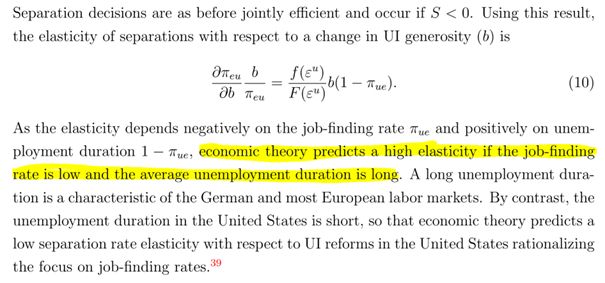
March 27, 2025 at 7:24 AM
We show that we should expect such a strong reaction of separation rates after UI reforms in countries with low job-finding rates as in 🇩🇪 & most 🇪🇺 countries, while the main adjustment will come from job-finding rates in countries like the 🇺🇸 with high job-finding rates. 9/10
Without the UI reform, German unemployment rates would have been 50% higher a decade later. This model-based estimate is confirmed by an empirical estimate (synthetic control estimate). 8/10
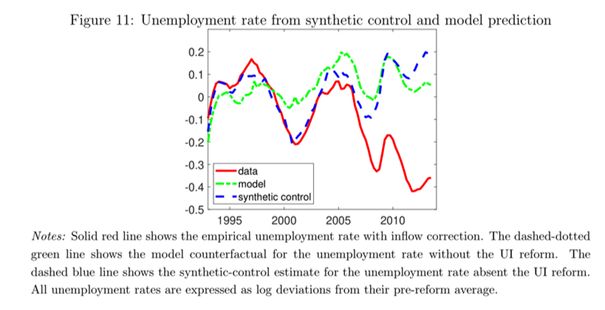
March 27, 2025 at 7:24 AM
Without the UI reform, German unemployment rates would have been 50% higher a decade later. This model-based estimate is confirmed by an empirical estimate (synthetic control estimate). 8/10
In the second part of the paper, we generalize our empirical findings based on economic theory. We develop a model with a frictional labor market and demonstrate that the predictions from theory match closely the empirical facts on average and with respect to heterogeneity. 7/10
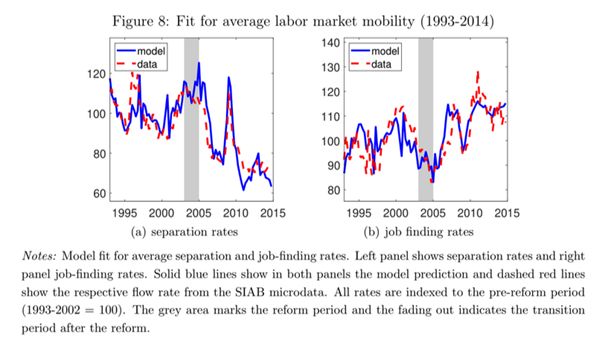
March 27, 2025 at 7:24 AM
In the second part of the paper, we generalize our empirical findings based on economic theory. We develop a model with a frictional labor market and demonstrate that the predictions from theory match closely the empirical facts on average and with respect to heterogeneity. 7/10
The mechanism is a trade-off between wages and job stability: long-term employed workers accepted wage declines for additional job stability to prevent unemployment. This wage-job-stability trade-off is known in theory but we demonstrate its empirical importance! 6/10
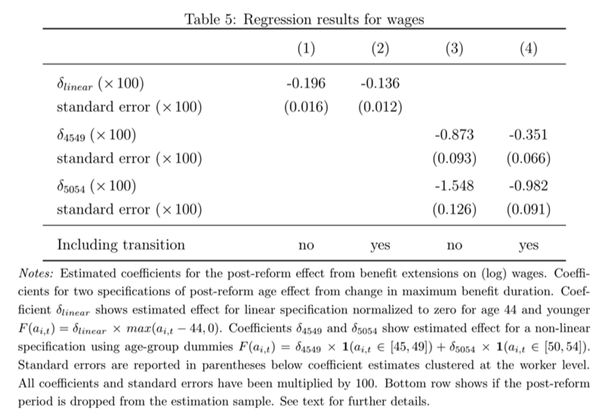
March 27, 2025 at 7:24 AM
The mechanism is a trade-off between wages and job stability: long-term employed workers accepted wage declines for additional job stability to prevent unemployment. This wage-job-stability trade-off is known in theory but we demonstrate its empirical importance! 6/10
We provide causal evidence of the decline in UI generosity on the separation rate decline by exploiting that different worker groups have been differently affected by the reform (old and young workers, short- and long-term employed workers). 5/10
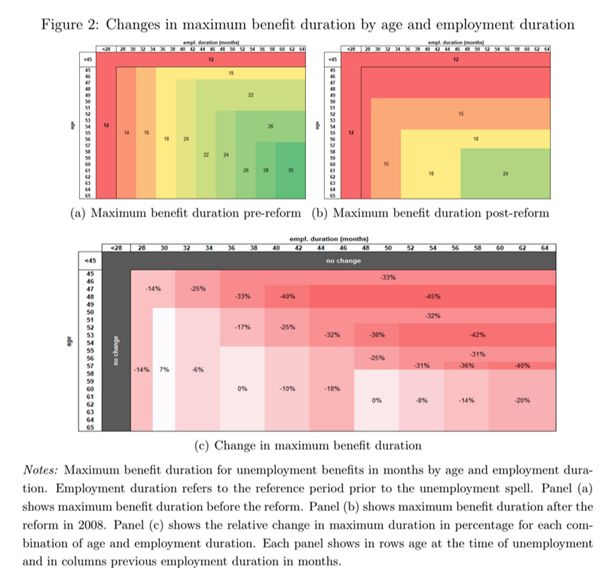
March 27, 2025 at 7:24 AM
We provide causal evidence of the decline in UI generosity on the separation rate decline by exploiting that different worker groups have been differently affected by the reform (old and young workers, short- and long-term employed workers). 5/10
The decline is strongest for workers who we typically think of as the least affected by UI reforms: older and long-term employed workers. These workers constitute most of the employment in the German labor market. 4/10
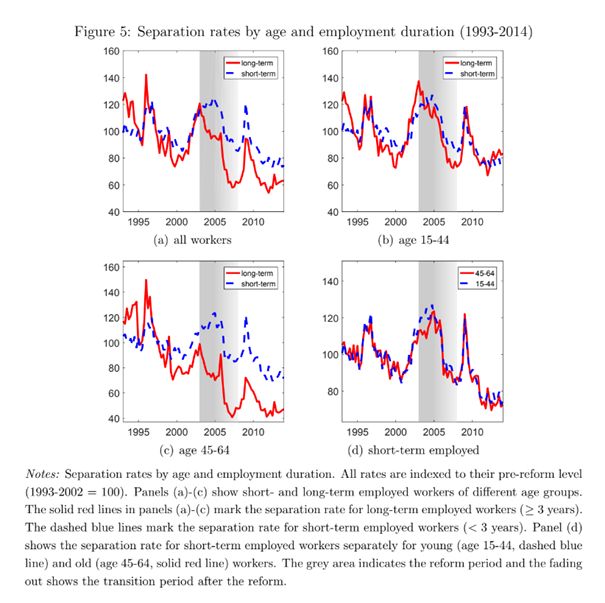
March 27, 2025 at 7:24 AM
The decline is strongest for workers who we typically think of as the least affected by UI reforms: older and long-term employed workers. These workers constitute most of the employment in the German labor market. 4/10
Decomposing the decline in the unemployment rate in the decade after the reform, we find that 76% of the decline came from lower separation rates only about one-third of the decline came from higher job-finding rates. 3/10
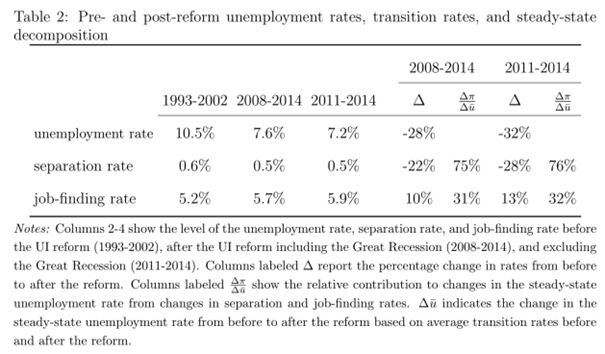
March 27, 2025 at 7:24 AM
Decomposing the decline in the unemployment rate in the decade after the reform, we find that 76% of the decline came from lower separation rates only about one-third of the decline came from higher job-finding rates. 3/10
We study this question based on the German Hartz reforms, one of the largest UI reforms in recent decades. After the reform unemployment has been in half. How? The key was not more jobs found (higher job-finding rates) but fewer jobs lost (lower separation rates). 2/10
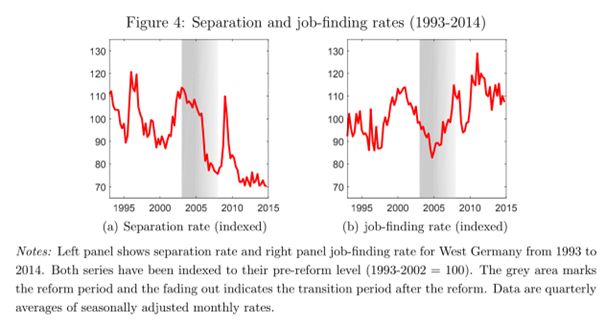
March 27, 2025 at 7:24 AM
We study this question based on the German Hartz reforms, one of the largest UI reforms in recent decades. After the reform unemployment has been in half. How? The key was not more jobs found (higher job-finding rates) but fewer jobs lost (lower separation rates). 2/10
Great to see our paper “Unemployment insurance reforms and labor market dynamics” out in The Review Economic Studies. With @macrophilip.bsky.social & Benjamin Hartung, we revisit the old question of labor market research of the effects of unemployment insurance reforms on unemployment rates. 1/10
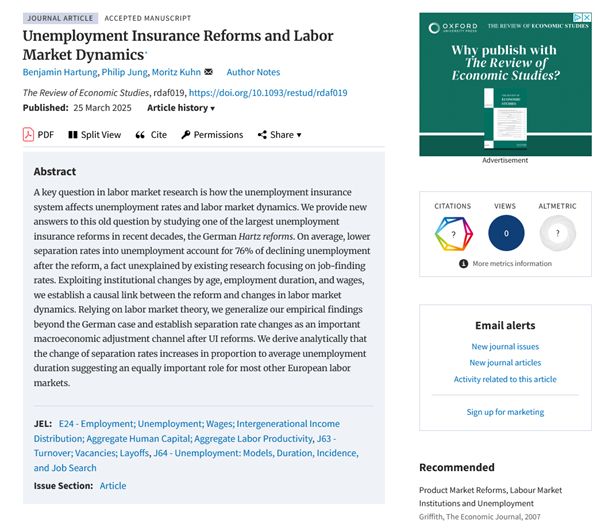
March 27, 2025 at 7:24 AM
Great to see our paper “Unemployment insurance reforms and labor market dynamics” out in The Review Economic Studies. With @macrophilip.bsky.social & Benjamin Hartung, we revisit the old question of labor market research of the effects of unemployment insurance reforms on unemployment rates. 1/10
This week in the Macro @EPoS224 Seminar at @EconUniMannheim we have Adam Hal Spencer from @UniBonn presenting
"Labour Market Monopsony and the Dynamic Gains to Openness Reforms"
@minkikim.bsky.social @andreas-gulyas.bsky.social @mazkarate.bsky.social @anamoremaldo.bsky.social
"Labour Market Monopsony and the Dynamic Gains to Openness Reforms"
@minkikim.bsky.social @andreas-gulyas.bsky.social @mazkarate.bsky.social @anamoremaldo.bsky.social
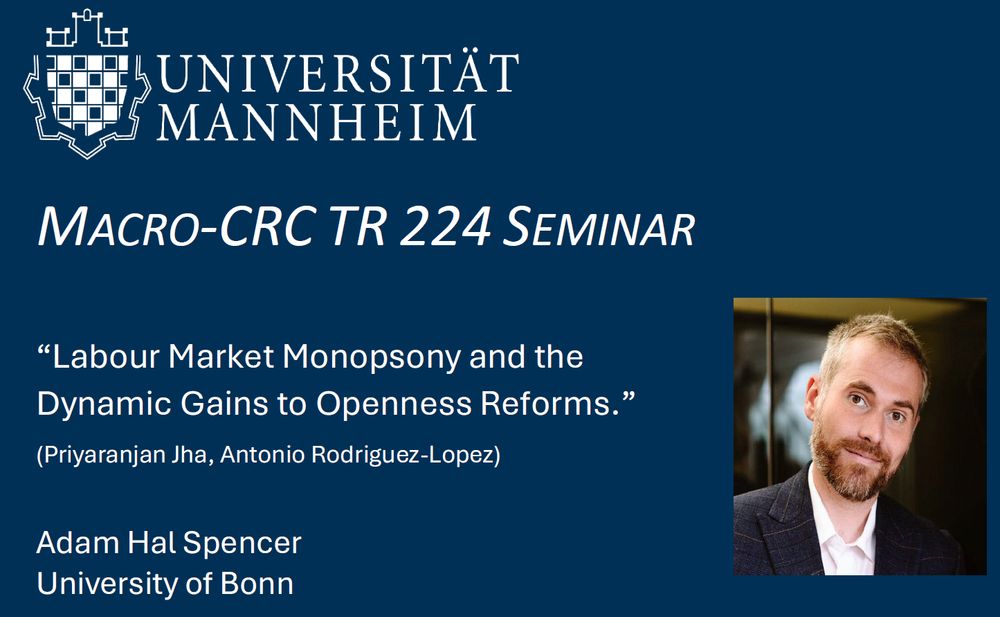
March 11, 2025 at 2:53 PM
This week in the Macro @EPoS224 Seminar at @EconUniMannheim we have Adam Hal Spencer from @UniBonn presenting
"Labour Market Monopsony and the Dynamic Gains to Openness Reforms"
@minkikim.bsky.social @andreas-gulyas.bsky.social @mazkarate.bsky.social @anamoremaldo.bsky.social
"Labour Market Monopsony and the Dynamic Gains to Openness Reforms"
@minkikim.bsky.social @andreas-gulyas.bsky.social @mazkarate.bsky.social @anamoremaldo.bsky.social
We are extremely excited to welcome this week Mike Golosov from the University of Chicago to the Macro-CRC Seminar at the University of Mannheim
Mike will present "A Beckerian Theory of Taxation"
@minkikim.bsky.social @andreas-gulyas.bsky.social @mazkarate.bsky.social @anamoremaldo.bsky.social
Mike will present "A Beckerian Theory of Taxation"
@minkikim.bsky.social @andreas-gulyas.bsky.social @mazkarate.bsky.social @anamoremaldo.bsky.social
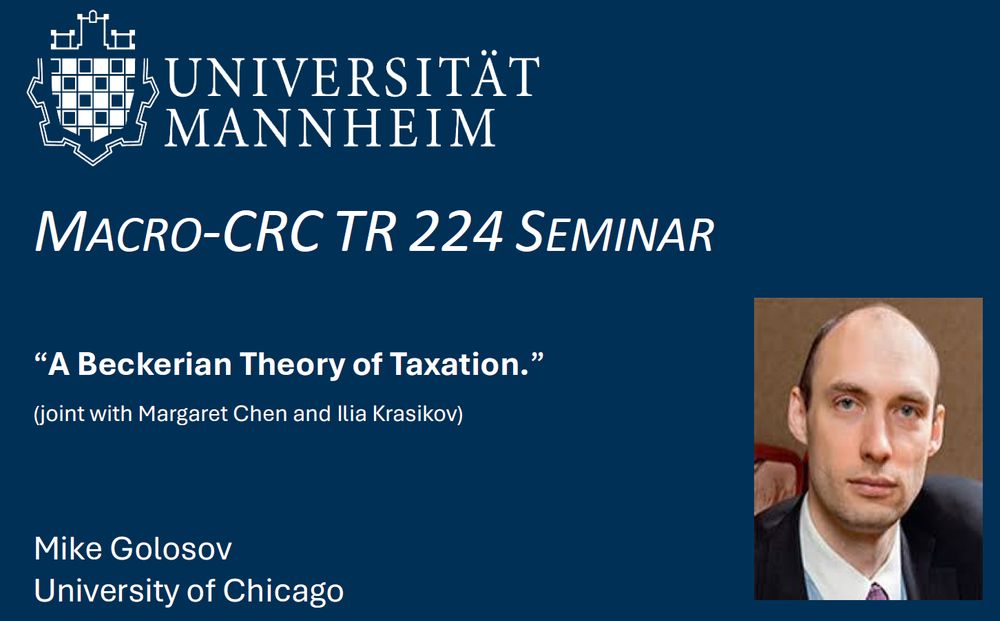
February 24, 2025 at 3:00 PM
We are extremely excited to welcome this week Mike Golosov from the University of Chicago to the Macro-CRC Seminar at the University of Mannheim
Mike will present "A Beckerian Theory of Taxation"
@minkikim.bsky.social @andreas-gulyas.bsky.social @mazkarate.bsky.social @anamoremaldo.bsky.social
Mike will present "A Beckerian Theory of Taxation"
@minkikim.bsky.social @andreas-gulyas.bsky.social @mazkarate.bsky.social @anamoremaldo.bsky.social
Um die Deindustrialisierung zu stoppen, gibt es eine einfache Politik: Kauft mehr Panzer!
Es sichert Arbeitsplätze im Verarbeitenden Gewerbe & führt zu mehr Sicherheit in Europa!
@schularick.bsky.social
@clemensfuest.bsky.social
@robert-habeck.de
@ralphbollmann.bsky.social
Es sichert Arbeitsplätze im Verarbeitenden Gewerbe & führt zu mehr Sicherheit in Europa!
@schularick.bsky.social
@clemensfuest.bsky.social
@robert-habeck.de
@ralphbollmann.bsky.social

February 22, 2025 at 9:24 AM
Um die Deindustrialisierung zu stoppen, gibt es eine einfache Politik: Kauft mehr Panzer!
Es sichert Arbeitsplätze im Verarbeitenden Gewerbe & führt zu mehr Sicherheit in Europa!
@schularick.bsky.social
@clemensfuest.bsky.social
@robert-habeck.de
@ralphbollmann.bsky.social
Es sichert Arbeitsplätze im Verarbeitenden Gewerbe & führt zu mehr Sicherheit in Europa!
@schularick.bsky.social
@clemensfuest.bsky.social
@robert-habeck.de
@ralphbollmann.bsky.social
Ich freue mich bereits auf die Diskussionsrunde nächste Woche an der Uni Mannheim zum Thema
"Politische und wirtschaftliche Weichenstellungen nach der Wahl"
www.uni-mannheim.de/newsroom/pre...
Mittwoch, 26. Februar 2025, 17:30 bis 19:15 Uhr in der Aula der Uni Mannheim.
"Politische und wirtschaftliche Weichenstellungen nach der Wahl"
www.uni-mannheim.de/newsroom/pre...
Mittwoch, 26. Februar 2025, 17:30 bis 19:15 Uhr in der Aula der Uni Mannheim.
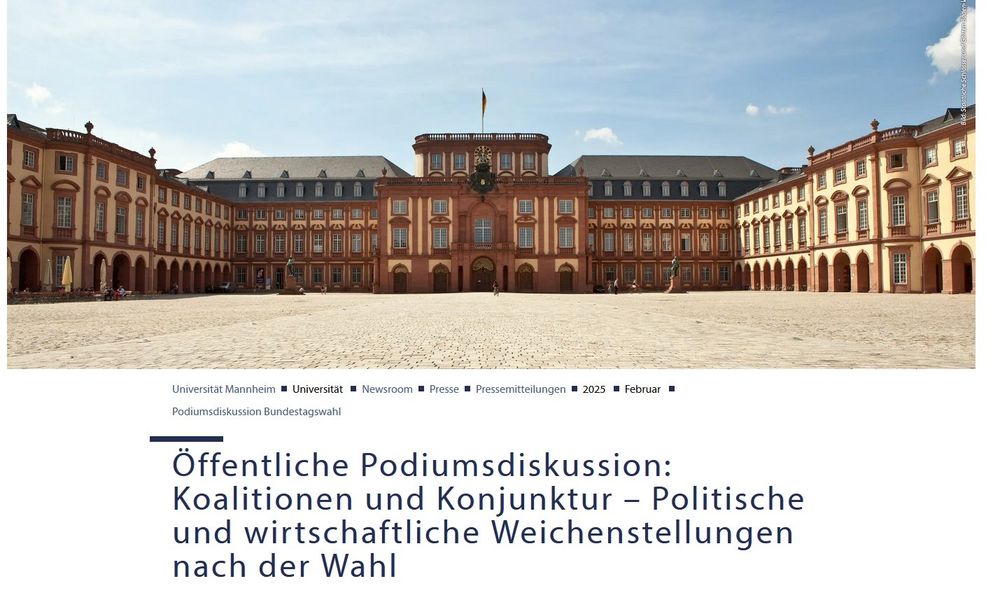
February 21, 2025 at 9:09 AM
Ich freue mich bereits auf die Diskussionsrunde nächste Woche an der Uni Mannheim zum Thema
"Politische und wirtschaftliche Weichenstellungen nach der Wahl"
www.uni-mannheim.de/newsroom/pre...
Mittwoch, 26. Februar 2025, 17:30 bis 19:15 Uhr in der Aula der Uni Mannheim.
"Politische und wirtschaftliche Weichenstellungen nach der Wahl"
www.uni-mannheim.de/newsroom/pre...
Mittwoch, 26. Februar 2025, 17:30 bis 19:15 Uhr in der Aula der Uni Mannheim.
In this week's Macro-CRC TR224 Seminar at Uni Mannheim Johannes Boehm will present
"The Network Origins of Firm Dynamics: Contracting Frictions and Dynamism with Long-Term Relationships"
@minkikim.bsky.social @andreas-gulyas.bsky.social @mazkarate.bsky.social @anamoremaldo.bsky.social
"The Network Origins of Firm Dynamics: Contracting Frictions and Dynamism with Long-Term Relationships"
@minkikim.bsky.social @andreas-gulyas.bsky.social @mazkarate.bsky.social @anamoremaldo.bsky.social
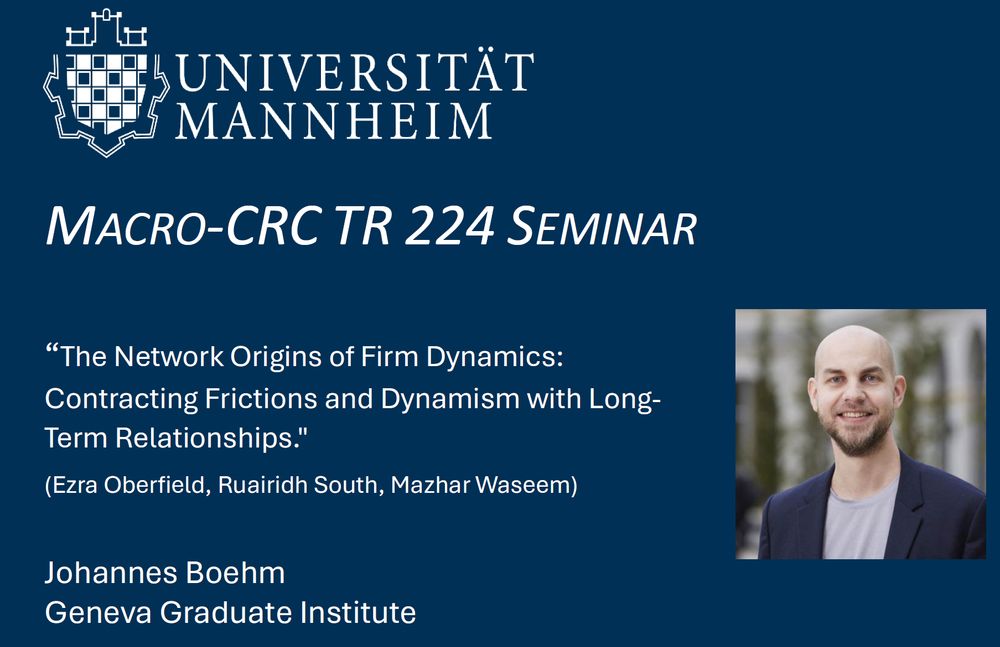
February 19, 2025 at 7:49 AM
In this week's Macro-CRC TR224 Seminar at Uni Mannheim Johannes Boehm will present
"The Network Origins of Firm Dynamics: Contracting Frictions and Dynamism with Long-Term Relationships"
@minkikim.bsky.social @andreas-gulyas.bsky.social @mazkarate.bsky.social @anamoremaldo.bsky.social
"The Network Origins of Firm Dynamics: Contracting Frictions and Dynamism with Long-Term Relationships"
@minkikim.bsky.social @andreas-gulyas.bsky.social @mazkarate.bsky.social @anamoremaldo.bsky.social
We are excited to start our Macro CRC seminar series at Mannheim with Kjetil Storesletten presenting
“Fiscal Progressivity of the U.S. Federal and State Governments”
“Fiscal Progressivity of the U.S. Federal and State Governments”
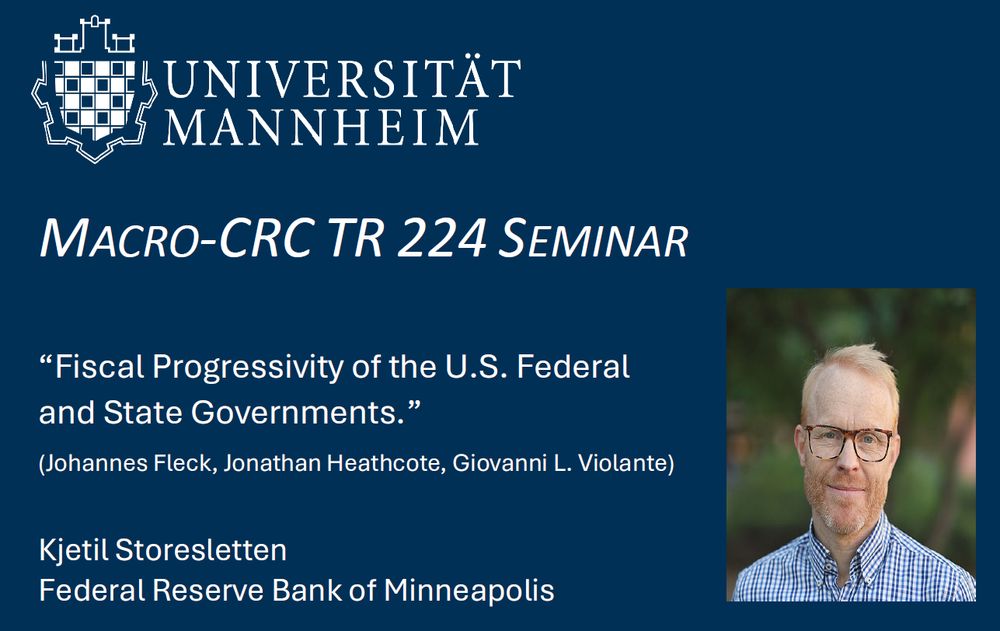
February 10, 2025 at 11:16 AM
We are excited to start our Macro CRC seminar series at Mannheim with Kjetil Storesletten presenting
“Fiscal Progressivity of the U.S. Federal and State Governments”
“Fiscal Progressivity of the U.S. Federal and State Governments”
Tolles Interview heute in der FAS mit @erikbryn.bsky.social zur Künstlichen Intelligenz. Er betont auch wieder das zentrale Problem europäischer Politik: "Sie werden nie wirtschaftlichen Erfolg haben, wenn Sie alles einfrieren wollen." Es braucht Willen zur Veränderung!
@patrick-bernau.de
@patrick-bernau.de
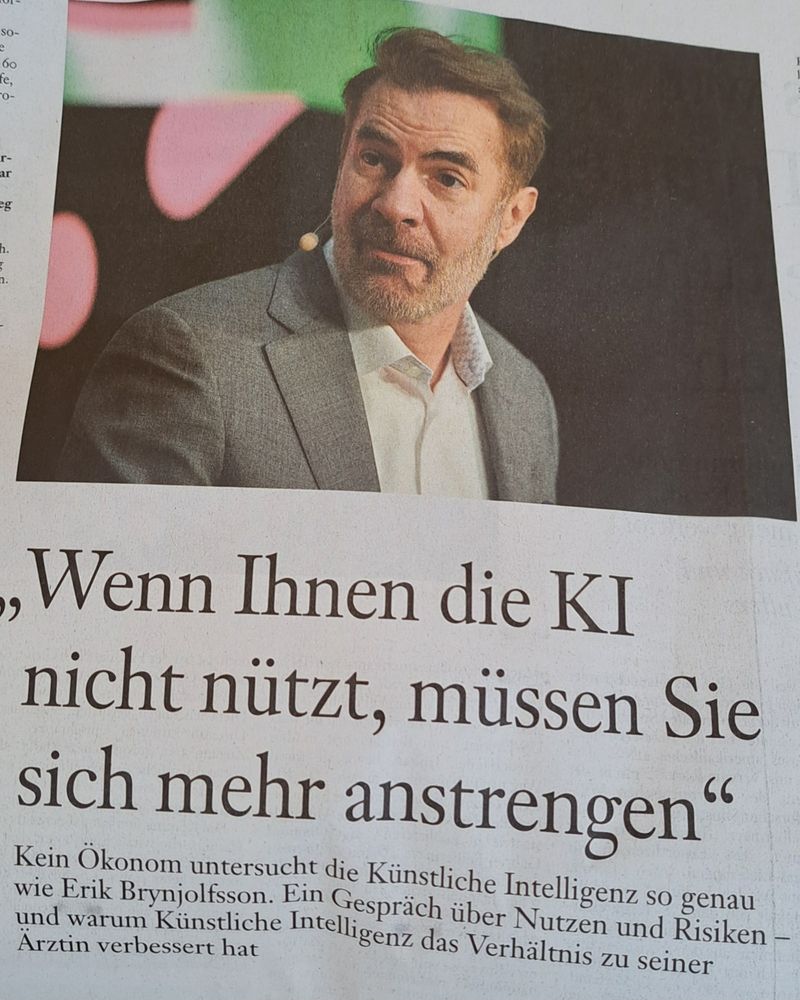
February 8, 2025 at 9:38 AM
Tolles Interview heute in der FAS mit @erikbryn.bsky.social zur Künstlichen Intelligenz. Er betont auch wieder das zentrale Problem europäischer Politik: "Sie werden nie wirtschaftlichen Erfolg haben, wenn Sie alles einfrieren wollen." Es braucht Willen zur Veränderung!
@patrick-bernau.de
@patrick-bernau.de
Diese Forschungsergebnisse könnten auch für die deutsche Politik von Interesse sein. Bauauflagen und Regulierung führen zu kleinen Firmen und weniger Wachstum im Bausektor.
www.nber.org/digest
Wer den Wohnungsmangel lösen will, muss Auflagen senken und Bauen einfacher machen
www.nber.org/digest
Wer den Wohnungsmangel lösen will, muss Auflagen senken und Bauen einfacher machen
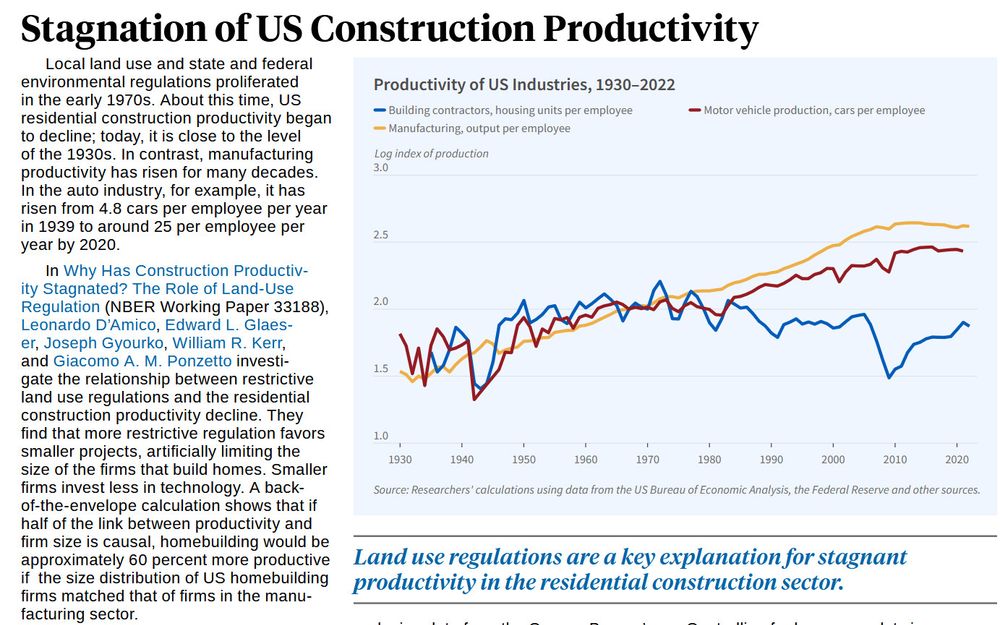
February 4, 2025 at 6:43 AM
Diese Forschungsergebnisse könnten auch für die deutsche Politik von Interesse sein. Bauauflagen und Regulierung führen zu kleinen Firmen und weniger Wachstum im Bausektor.
www.nber.org/digest
Wer den Wohnungsmangel lösen will, muss Auflagen senken und Bauen einfacher machen
www.nber.org/digest
Wer den Wohnungsmangel lösen will, muss Auflagen senken und Bauen einfacher machen
It was a great visit to the Central Bank of Turkey last week. We discussed about the economic situation in Turkey and economic research with Governor Fatih Karahan. I also presented my paper
"To Have or Not to Have: Understanding Wealth Inequality"
and received great feedback! Thanks a lot!
"To Have or Not to Have: Understanding Wealth Inequality"
and received great feedback! Thanks a lot!



December 27, 2024 at 6:31 PM
It was a great visit to the Central Bank of Turkey last week. We discussed about the economic situation in Turkey and economic research with Governor Fatih Karahan. I also presented my paper
"To Have or Not to Have: Understanding Wealth Inequality"
and received great feedback! Thanks a lot!
"To Have or Not to Have: Understanding Wealth Inequality"
and received great feedback! Thanks a lot!
I am very excited to travel today to Istanbul to present tomorrow at the Central Bank of Turkey joint work with Pavel Brendler and Ulrike Steins
"To Have or Not To Have: Understanding Wealth Inequality"
Thanks a lot to Fatih Karahan for the invitation. Link to paper drive.google.com/file/d/15Duk...
"To Have or Not To Have: Understanding Wealth Inequality"
Thanks a lot to Fatih Karahan for the invitation. Link to paper drive.google.com/file/d/15Duk...

December 18, 2024 at 7:31 AM
I am very excited to travel today to Istanbul to present tomorrow at the Central Bank of Turkey joint work with Pavel Brendler and Ulrike Steins
"To Have or Not To Have: Understanding Wealth Inequality"
Thanks a lot to Fatih Karahan for the invitation. Link to paper drive.google.com/file/d/15Duk...
"To Have or Not To Have: Understanding Wealth Inequality"
Thanks a lot to Fatih Karahan for the invitation. Link to paper drive.google.com/file/d/15Duk...
I am very excited to have the opportunity to present tomorrow at the University of Zurich my paper
"To Have or Not to Have: Understanding Wealth Inequality" that is joint work with Pavel Brendler and Ulrike Steins.
"To Have or Not to Have: Understanding Wealth Inequality" that is joint work with Pavel Brendler and Ulrike Steins.

December 11, 2024 at 4:04 PM
I am very excited to have the opportunity to present tomorrow at the University of Zurich my paper
"To Have or Not to Have: Understanding Wealth Inequality" that is joint work with Pavel Brendler and Ulrike Steins.
"To Have or Not to Have: Understanding Wealth Inequality" that is joint work with Pavel Brendler and Ulrike Steins.
On my way to London to present tomorrow at LSE
"To Have or Not to Have: Understanding Wealth Inequality"
joint work with Pavel Brendler
I am very excited about the opportunity and look forward to the discussion and feedback on our new results!
"To Have or Not to Have: Understanding Wealth Inequality"
joint work with Pavel Brendler
I am very excited about the opportunity and look forward to the discussion and feedback on our new results!

December 9, 2024 at 5:19 AM
On my way to London to present tomorrow at LSE
"To Have or Not to Have: Understanding Wealth Inequality"
joint work with Pavel Brendler
I am very excited about the opportunity and look forward to the discussion and feedback on our new results!
"To Have or Not to Have: Understanding Wealth Inequality"
joint work with Pavel Brendler
I am very excited about the opportunity and look forward to the discussion and feedback on our new results!
Die Neue Sachlichkeit in der Kunsthalle Mannheim. Eine spannende Ausstellung über die gesellschaftlichen Veränderungen vor 100 Jahren. Ein weiterer guter Grund mal wieder nach Mannheim zu kommen.

December 7, 2024 at 1:53 PM
Die Neue Sachlichkeit in der Kunsthalle Mannheim. Eine spannende Ausstellung über die gesellschaftlichen Veränderungen vor 100 Jahren. Ein weiterer guter Grund mal wieder nach Mannheim zu kommen.
This week we will have Diego Daruich in our Macro-CRC Seminar at U Mannheim. Diego will present
"An Equilibrium Analysis of the Effects of Neighborhood-Based Interventions on Children"
@minkikim.bsky.social @mazkarate.bsky.social
"An Equilibrium Analysis of the Effects of Neighborhood-Based Interventions on Children"
@minkikim.bsky.social @mazkarate.bsky.social

December 3, 2024 at 7:57 AM
This week we will have Diego Daruich in our Macro-CRC Seminar at U Mannheim. Diego will present
"An Equilibrium Analysis of the Effects of Neighborhood-Based Interventions on Children"
@minkikim.bsky.social @mazkarate.bsky.social
"An Equilibrium Analysis of the Effects of Neighborhood-Based Interventions on Children"
@minkikim.bsky.social @mazkarate.bsky.social
We are happy to have this week @leokaas.bsky.social in our Macro-CRC Seminar at Uni Mannheim. Leo will present "Job Ladder and Wealth Dynamics in General Equilibrium"

November 26, 2024 at 7:44 AM
We are happy to have this week @leokaas.bsky.social in our Macro-CRC Seminar at Uni Mannheim. Leo will present "Job Ladder and Wealth Dynamics in General Equilibrium"
We are happy to have this week in our Macro CRC 224 Seminar at Uni Mannheim @sylvain-catherine.bsky.social presenting
"How do Income-Driven Repayment Plans Benefit Student Debt Borrowers?"
"How do Income-Driven Repayment Plans Benefit Student Debt Borrowers?"

November 19, 2024 at 7:29 AM
We are happy to have this week in our Macro CRC 224 Seminar at Uni Mannheim @sylvain-catherine.bsky.social presenting
"How do Income-Driven Repayment Plans Benefit Student Debt Borrowers?"
"How do Income-Driven Repayment Plans Benefit Student Debt Borrowers?"

